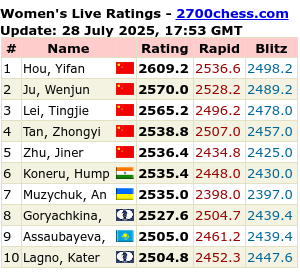Even on a limited budget, we can still host interesting tournaments that attract strong foreign players.
ONE observation made by Malaysian Chess Federation honorary life president Datuk Tan Chin Nam at the prize-giving ceremony of the Malaysia Open last month was that chess promotion need not mean holding elite tournaments graced by the best players.
It was a statement that struck a chord. He was right, of course.
Best of the best: Vietnam’s Nguyen Ngoc Truong Son accepting his prize from Masterskill University College of Health Sciences director Tunku Kamel Tunku Rijaludin.
Let’s leave the elite tournaments to organisers with the big bucks. If we spend within our means, we can still hold interesting tournaments that attract reasonably strong foreign players.
After all, as Tan reasoned, chess professionals still have to make a living off the game.
Through the Malaysia Chess Festival, we provide opportunities for players to enjoy themselves and win some cash prizes, aside from raising the standard of the local game and enabling them to earn their international title norms.
A successful chess event by Tan’s interpretation then would mean having a tournament that satisfies these conditions: that it must be organised for the players, by the players and be about the players.
If I were to draw a conclusion about the Malaysia Chess Festival based on these conditions, then yes, the event was a success.
The same could be said about the Masterskill Kuala Lumpur Open held earlier this month. I could apply the same three conditions to the KL Open and come to the conclusion that it, too, was a success for the Kuala Lumpur Chess Association.
Of course, I cannot compare the KL Open to the Malaysia Open.
They were two completely different tournaments although they shared many similarities. Both were equally competitive and suspenseful. Players jostled for position and they jostled hard for the points.
Nevertheless, the smaller number of players in the KL Open together with a more compact playing area gave the tournament its own special characteristic.
Players were sitting closer to one another, almost elbow to elbow in many cases. Not one of the visiting grandmasters or international masters minded. No prima donnas among them, they came here to play chess and enjoy a bit of competitive fun.
On the chess board, there were big battles. But as much as I would like to say that it was a very tight race to the finish point, it wasn’t exactly so.
The second half of the tournament was dominated by a 19-year-old grandmaster from Vietnam. Presently, Nguyen Ngoc Truong Son is ranked as No.2 in his country.
At the Malaysia Open, he was among four or five players who remained unbeaten throughout that event. With a little more luck, he could have tied for the first place too.
Well, at the KL Open, he showed why his consistency has made him one of Vietnam’s brightest chess stars.
After the fourth round, he shared the top position with two other players but by the end of the fifth round, he was leading the field. However, he allowed his compatriot, the veteran Vietnamese grandmaster Dao Thien Hai, to catch up with him on points and for two rounds, they were running neck and neck towards the finish post.
Dao, however, slipped up in the eighth round. Here was the perfect chance for the 19-year-old. Obviously, he had learnt his lesson at the Malaysia Open and went into the final round with a lot of determination.
He refused to accept any other result but a win and in the end, he got what he wanted: a valuable point from the Uzbekistan grandmaster Marat Dzhumaev.
In second place was Indonesian grandmaster Susanto Megaranto who was just half a point behind the winner. Interestingly enough, Susanto is also the second highest ranked player in his country so there was also a lot of pressure on him to perform.
Unfortunately, he had a poor start, losing two of his first five games. But thereafter, he managed to pull his game together and reeled off consecutive wins in his last four games. His most important point came in the last round when he beat Dao.
(source: All In The Planning blog by SS Quah)





























No comments:
Post a Comment